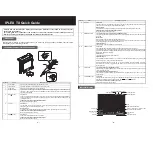
9.
Press the ENTER key to confirm the second calibration point (e.g. 10.0
ppm). The display will show the next calibration option, 100.0 ppm.
To exit from the 2-point calibration, press the
CAL
key. The LCD will show
“PXX mV” momentarily which is the ISE slope in mV value.
The meter then reverts to ion measurement mode. The calibration values are
successfully stored into the memory. Otherwise an error message “
Er3
” will be
displayed if the slope of ISE is lower than 15mV/decade or higher than
90mV/decade.
10.
For a 3-point calibration when the LCD shows “
100.0
”, press the
ENTER
key to proceed to last calibration point. Repeat the above procedure.
At the end of the 3 point calibration the meter will display the mV slope of
the electrode as “PXX” and the calibration values will be successfully stored.
Error messages will appear in the LCD if the calibration was unsuccessful with
no values stored into memory.
3.4 TEMPERATURE CALIBRATION
3.4.1 With Temperature probe
The temperature probe provided with the meter is factory-calibrated. Over
time, temperature calibration may drift and require calibration. If there is a
need to replace the probe the temperature probe should be calibrated prior to
pH calibration.
1.
Connect the temperature probe to the meter. Press the
MODE
key to
enter the Temperature mode until “°
C
” annunciator appears on the LCD.
2.
Compare the displayed value to a NIST certified thermometer or other
thermometer known to be accurate. For best accuracy, place both the probe
and thermometer in a constant temperature bath.
3.
Press the
CAL
key to enter the temperature calibration mode. The LCD
shows “
CA
” momentarily and the displayed reading flashes.
4.
Press the
p
and
q
keys until the LCD display shows the desired
temperature. The meter allows an adjustable maximum value of ± 5 °C
from the factory default.
17








































